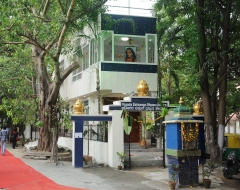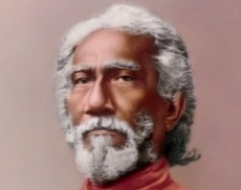Mahasamadhi Anniversary of Sri Sri Swami Sri Yukteswar Giri
Date : March 9th, 2018
Timings: 4.30 pm-7.00 pm
Yogoda Satsanga Dhyana Kendra, Bengaluru conducted a special event on March 9th from 4.30 pm am to 7.00 pm, on the occasion of Mahasamadhi Anniversary of our Paramaguru Sri Sri Swami Sri Yukteswar Giri
The first session started at 4:30 pm, The Mandir was beautifully decorated and a majestic photo of Sri Sri Swami Sri Yukteswar Giri was placed, much to the delight of the devotees entering the mandir. This was followed by Arati, opening prayer: Brahmanandam and chant : “Think Ye” were sung. After which the devotees meditated for 20 minutes.
In the next session, the leader read out following excerpts from the book: “Autobiography of Yogi” by our Gurudeva Paramahansa Yogananda, from the sections dedicated to his Guru:
I Meet My Master, Sri Yukteswar
“My relationship with Dyananda’s followers grew steadily worse. The household was alienated, hurt by my determined aloofness. My strict adherence to meditation on the very Ideal for which I had left home and all worldly ambitions called forth shallow criticism on all sides. Torn by spiritual anguish, I entered the attic one dawn, resolved to pray until answer was vouchsafed. “Merciful Mother of the Universe, teach me Thyself through visions, or through a guru sent by Thee!” The passing hours found my sobbing pleas without response. Suddenly I felt lifted as though bodily to a sphere uncircumscribed. “Thy Master cometh today!” A divine womanly voice came from everywhere and nowhere. This supernal experience was pierced by a shout from a definite locale. A young priest nicknamed Habu was calling me from the downstairs kitchen. “Mukunda, enough of meditation! You are needed for an errand.” Another day I might have replied impatiently; now I wiped my tear- swollen face and meekly obeyed the summons. Together Habu and I set out for a distant market place in the Bengali section of Benares. The ungentle Indian sun was not yet at zenith as we made our purchases in the bazaars. We pushed our way through the colorful medley of housewives, guides, priests, simply-clad widows, dignified Brahmins, and the ubiquitous holy bulls. Passing an inconspicuous lane, I turned my head and surveyed the narrow length. A Christlike man in the ocher robes of a swami stood motionless at the end of the road. Instantly and anciently familiar he seemed; my gaze fed hungrily for a trice. Then doubt assailed me. “You are confusing this wandering monk with someone known to you,” I thought.
“Dreamer, walk on.” After ten minutes, I felt heavy numbness in my feet. As though turned to stone, they were unable to carry me farther. Laboriously I turned around; my feet regained normalcy. I faced the opposite direction; again the curious weight oppressed me. “The saint is magnetically drawing me to him!” With this thought, I heaped my parcels into the arms of Habu. He had been observing my erratic footwork with amazement, and now burst into laughter. “What ails you? Are you crazy?. My tumultuous emotion prevented any retort; I sped silently away. Retracing my steps as though wing-shod, I reached the narrow lane. My quick glance revealed the quiet figure, steadily gazing in my direction. A few eager steps and I was at his feet. “Gurudeva!” The divine face was none other than he of my thousand visions. These halcyon eyes, in leonine head with pointed beard and flowing locks, had oft peered through gloom of my nocturnal reveries, holding a promise I had not fully understood.
O my own, you have come to me!” My guru uttered the words again and again in Bengali, his voice tremulous with joy. “How many years I have waited for you!” We entered a oneness of silence; words seemed the rankest superfluities. Eloquence flowed in soundless chant from heart of master to disciple. With an antenna of irrefragable insight I sensed that my guru knew God, and would lead me to Him. The obscuration of this life disappeared in a fragile dawn of prenatal memories. Dramatic time! Past, present, and future are its cycling scenes. This was
My hand in his, my guru led me to his temporary residence in the Rana Mahal section of the city. His athletic figure moved with firm tread. Tall, erect, about fifty-five at this time, he was active and vigorous as a young man. His dark eyes were large, beautiful with plumbless wisdom. Slightly curly hair softened a face of striking power. Strength mingled subtly with gentleness. As we made our way to the stone balcony of a house overlooking the Ganges, he said affectionately: I will give you my hermitages and all I possess.” “Sir, I come for wisdom and God-contact. Those are your treasure- troves I am after!” The swift Indian twilight had dropped its half-curtain before my master spoke again. His eyes held unfathomable tenderness. “I give you my unconditional love.” Precious words! A quarter-century elapsed before I had another auricular proof of his love. His lips were strange to ardor; silence became his oceanic heart.
I will give you my hermitages and all I possess.” “Sir, I come for wisdom and God-contact. Those are your treasure- troves I am after!” The swift Indian twilight had dropped its half-curtain before my master spoke again. His eyes held unfathomable tenderness. “I give you my unconditional love.” Precious words! A quarter-century elapsed before I had another auricular proof of his love. His lips were strange to ardor; silence became his oceanic heart.
Last Days With My Guru
“Guruji, I am glad to find you alone this morning.” I had just arrived at the Serampore hermitage, carrying a fragrant burden of fruit and roses. Sri Yukteswar glanced at me meekly. “What is your question?” Master looked about the room as though he were seeking escape. “Guruji, I came to you as a high-school youth; now I am a grown man, even with a gray hair or two. Though you have showered me with silent affection from the first hour to this, do you realize that once only, on the day of meeting, have you ever said, ‘I love you’?” I looked at him pleadingly. Master lowered his gaze. “Yogananda, must I bring out into the cold realms of speech the warm sentiments best guarded by the wordless heart?” “Guruji, I know you love me, but my mortal ears ache to hear you say so.” “Be it as you wish. During my married life I often yearned for a son, to train in the yogic path.
But when you came into my life, I was content; in you I have found my son.” Two clear teardrops stood in Sri Yukteswar’s eyes. “Yogananda, I love you always.”
In a few days our little group reached Calcutta. Eager to see Sri Yukteswar, I was disappointed to hear that he had left Serampore and was now in Puri, about three hundred miles to the south. “Come to Puri ashram at once.” This telegram was sent on March 8th by a brother disciple to Atul Chandra Roy Chowdhry, one of Master’s chelas in Calcutta. News of the message reached my ears; anguished at its implications, I dropped to my knees and implored God that my guru’s life be spared. As I was about to leave Father’s home for the train, a divine voice spoke within. “Do not go to Puri tonight. Thy prayer cannot be granted.” “Lord,” I said, grief-stricken, “Thou dost not wish to engage with me in a ‘tug of war’ at Puri, where Thou wilt have to deny my incessant prayers for Master’s life. Must he, then, depart for higher duties at Thy behest?” In obedience to the inward command, I did not leave that night for Puri. The following evening I set out for the train; on the way, at seven o’clock, a black astral cloud suddenly covered the sky. Later, while the train roared toward Puri, a vision of Sri Yukteswar appeared before me. He was sitting, very grave of countenance, with a light on each side. “Is it all over?” I lifted my arms beseechingly. He nodded, then slowly vanished. As I stood on the Puri train platform the following morning, still hoping against hope, an unknown man approached me. “Have you heard that your Master is gone?” He left me without another word; I never discovered who he was nor how he had known where to find me.
I entered the ashram room where Master’s body, unimaginably lifelike, was sitting in the lotus posture-a picture of health and loveliness. A short time before his passing, my guru had been slightly ill with fever, but before the day of his ascension into the Infinite, his body had become completely well. No matter how often I looked at his dear form I could not realize that its life had departed. His skin was smooth and soft; in his face was a beatific expression of tranquillity. He had consciously relinquished his body at the hour of mystic summoning. “The Lion of Bengal is gone!” I cried in a daze. I conducted the solemn rites on March 10th. Sri Yukteswar was buried with the ancient rituals of the swamis in the garden of his Puri ashram. His disciples later arrived from far and near to honor their guru at a vernal equinox memorial service. The Amrita Bazar Patrika, leading newspaper of Calcutta, carried his picture and the following report: The death Bhandara ceremony for Srimat Swami Sri Yukteswar Giri Maharaj, aged 81, took place at Puri on March 21. Many disciples came down to Puri for the rites. One of the greatest expounders of the Bhagavad Gita, Swami Maharaj was a great disciple of Yogiraj Sri Shyama Charan Lahiri Mahasaya of Benares. Swami Maharaj was the founder of several Yogoda Sat-Sanga (Self- Realization Fellowship) centers in India, and was the great inspiration behind the yoga movement which was carried to the West by Swami Yogananda, his principal disciple. It was Sri Yukteswarji’s prophetic powers and deep realization that inspired Swami Yogananda to cross the oceans and spread in America the message of the masters of India. His interpretations of the Bhagavad Gita and other scriptures testify to the depth of Sri Yukteswarji’s command of the philosophy, both Eastern and Western, and remain as an eye-opener for the unity between Orient and Occident. As he believed in the unity of all religious faiths, Sri Yukteswar Maharaj established Sadhu Sabha (Society of Saints) with the cooperation of leaders of various sects and faiths, for the inculcation of a scientific spirit in religion. At the time of his demise he nominated Swami Yogananda his successor as the president of Sadhu Sabha. India is really poorer today by the passing of such a great man. May all fortunate enough to have come near him inculcate in themselves the true spirit of India’s culture and sadhana which was personified in him.
Concluding session:
After the reading, the chant: “Thou Art My Life” was sung. This was followed by AUM Chanting and an affirmation on wisdom. Afterwhich, the session concluded with praying for others, healing prayer and closing prayer, followed by prasad distribution.
***


